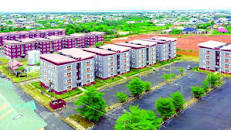Exploring Rent-to-Own Housing Solutions in Nigeria

Introduction
Accessing affordable housing is an arduous quest in various corners of the globe, and Nigeria is no exception. The burgeoning population, intertwined with urbanization and the scarcity of housing, has engendered an ever-expanding housing deficit. In the pursuit of groundbreaking alternatives, the concept of “rent-to-own” has gained traction in Nigeria as a potential means to bridge the chasm between the housing demand and citizens’ fiscal capacity. This article delves into the enigmatic realm of the rent-to-own housing model in Nigeria, unraveling its merits, challenges, and the potential cataclysmic repercussions it could have on the nation’s housing predicament.
Decoding Rent-to-Own
Rent-to-own epitomizes a housing arrangement that endows prospective homeowners with the opportunity to lease a property for a predetermined period, with the tantalizing option to purchase the property at a later juncture. During the tenancy, a fraction of the monthly rent paid by the tenant is typically allocated as a credit towards the eventual property acquisition. This approach offers a more malleable path to homeownership, especially for those who might not meet the criteria for conventional mortgage financing or grapple with a substantial upfront down payment.
Advantages of Rent-to-Own in Nigeria
Diminished Entry Barrier: The rent-to-own model’s crowning glory lies in its ability to alleviate the immediate financial strain on potential homeowners. With diminished upfront costs in comparison to a conventional property purchase, individuals and families are bestowed with a golden opportunity to venture into the housing market at an earlier juncture.
Gradual Equity Accumulation: Rent payments within a rent-to-own agreement often encompass a portion that contributes to the accumulation of equity in the property. Over time, tenants amass equity, facilitating a seamless transition from renter to homeowner.
Credit Enhancement: For individuals burdened with less-than-ideal credit scores, rent-to-own arrangements furnish an opportunity to bolster creditworthiness during the rental period. This credit amelioration can heighten the likelihood of securing a mortgage when the time comes for property acquisition.
Steadfast Housing Costs: Rent-to-own contracts typically cement the purchase price at the commencement of the agreement. This insulates tenants from the vicissitudes of property prices, affording them predictability in their housing costs.
Challenges and Deliberations
While the rent-to-own model proffers a plethora of advantages, it is not devoid of challenges and deliberations that necessitate attention:
Regulatory Landscape: The implementation of rent-to-own solutions necessitates a lucid legal framework that safeguards the rights of both tenants and property owners. In the absence of proper regulations, disputes and uncertainties may ensue.
Affordability: Despite mitigating the upfront financial burden, the monthly payments within rent-to-own agreements can still pose a challenge for low-income individuals. Striking a delicate balance between affordability and sustainability assumes paramount importance.
Property Maintenance: The onus of property maintenance and repairs during the rental period can metamorphose into a potential point of contention. Clearly delineating maintenance responsibilities within the contract is indispensable.
Exit Strategies: What befalls if the tenant elects not to acquire the property at the culmination of the rental period? A meticulously defined exit strategy assumes indispensability to address this scenario.
The Potential Implications on Nigeria’s Housing Crisis
The implementation of rent-to-own housing solutions harbors the potential to exert a momentous impact on Nigeria’s housing crisis:
Augmented Homeownership Rates: By proffering a more attainable pathway to homeownership, rent-to-own can contribute to an upsurge in homeownership rates, which, in turn, can foster resilient communities and more stable neighborhoods.
Alleviated Rental Pressure: As a greater number of individuals transition from renting to owning, the demand for rental properties may attain equilibrium. This could engender more reasonable rental prices for those who prefer to rent.
Economic Expansion: A thriving housing market can beget a ripple effect on the economy, engendering employment opportunities in construction, real estate, and allied industries.
Conclusion
Rent-to-own housing solutions have the potential to assuage some of the challenges posed by Nigeria’s housing deficit. By furnishing a pliable and accessible path to homeownership, this model could empower individuals and families to realize their dreams of homeownership while nurturing economic growth. Nonetheless, meticulous attention must be accorded to regulatory frameworks, affordability, and other potential obstacles to ensure the effective and responsible implementation of the rent-to-own model. As Nigeria continues to explore innovative solutions to its housing crisis, rent-to-own emerges as a promising option that warrants earnest contemplation.




